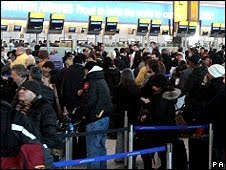Fresh measures to track terror suspects and strengthen airport security after the attempted Christmas Day bomb plot have been announced by Gordon Brown.
A "no-fly list" is to be set up to stop suspected terrorists from travelling to the UK while other individuals under suspicion will undergo thorough checks.
Direct flights between Yemen and the UK are also to be suspended until concerns about their safety are addressed.
The UK faced "active" terrorist threats from across the world, the PM said.
'Tracking terrorists'
Mr Brown ordered a review of airport security in the wake of the attempted Christmas Day bombing of a flight to Detroit, believed to have been planned in Yemen.
Following the review and further intelligence briefings, he told MPs that the government would introduce a range of measures to protect the UK's borders and further strengthen aviation and airport security.
He said the Home Office's current watch list - a register of known criminals and terrorists as well as those considered a threat to security - would be extended to identify those "posing the greatest risk" to the UK.
A new "no-fly list" will identify individuals who will not be allowed to enter the country because of suspected terrorist links.
Individuals who have attracted the attention of the authorities but are considered lower-risk will be listed in a second category.
They will be subject to "special measures", such as more extensive screening, before being allowed to fly to the UK, although officials said they could not divulge what this would entail.
By the end of the year, all UK airports and ports will be covered by the e-borders scheme, which he said meant information passengers provide when buying tickets can be checked against the watch lists.
Enhanced global co-operation would mean that suspect individuals could be checked against the watch list 24 hours before they boarded a flight to, or via, the UK.
Other initiatives he outlined to MPs include new teams of intelligence officers who will seek to identify individuals who present a threat to security early on, well before they come to the UK.
Ministers also want the EU, the US and other G8 nations to share intelligence about security threats more effectively and help countries with gaps in their security arrangements to fill them.
Mr Brown, who said he had discussed the measures with US President Barack Obama on Tuesday, also confirmed that new full body scanners would be introduced at British airports next week.
The prime minister said the objective of the enhanced security measures was to ensure terrorist movements could be "seamlessly tracked and disrupted" both in the UK and abroad.
"It is because we fully recognise the global nature of the terrorist threat we face today that our response must be truly global," he said.
"Some of the intelligence we need to protect our people against attacks will be here in Britain, some will be held by our international partners and passed to us, just as we help them with information about the threats they face."
Growing radicalisation
 Air passengers are set to face further security checks
Air passengers are set to face further security checks
The Conservatives, who have called for a "radical" rethink of the UK's security approach, welcomed the introduction of a "no-fly list" but said the threat posed by individuals already in the UK must be recognised.
Tory leader David Cameron said the man who tried to detonate the Christmas Day bomb was radicalised in the UK before going to Yemen.
"Doesn't that show that more needs to be done to tackle radicalisation right here in the UK?", he said.
Liberal Democrat leader Nick Clegg called for guarantees that peoples' civil liberties would be protected amid the tougher measures.
The BBC's Security Correspondent Frank Gardner said the move to suspend twice-weekly flights from Yemen to the UK was prompted by concerns that another attack on Western interests could be imminent.
UK officials were also worried that airport security at Sana'a, the Yemeni capital, was not good enough, he added.
The Nigerian man arrested for the attempted Christmas Day bombing has said he was given the bomb by al-Qaeda operatives in Yemen.
A meeting arranged at the end of the month to discuss assistance for Yemen has been downgraded to a two hour session but Mr Brown insisted the international community was still committed to tackling the root causes of extremism in Yemen and UK.
He added that by the end of this year, the UK would have given £100m to Yemen since 2007 to support political, social and economic reforms.
The prime minister added that UK aviation officials were currently in Yemen to discuss improved aviation security in the country and he hoped flights could be resumed as soon as possible.
 Air passengers are set to face further security checks
The Conservatives, who have called for a "radical" rethink of the UK's security approach, welcomed the introduction of a "no-fly list" but said the threat posed by individuals already in the UK must be recognised.
Tory leader David Cameron said the man who tried to detonate the Christmas Day bomb was radicalised in the UK before going to Yemen.
"Doesn't that show that more needs to be done to tackle radicalisation right here in the UK?", he said.
Liberal Democrat leader Nick Clegg called for guarantees that peoples' civil liberties would be protected amid the tougher measures.
The BBC's Security Correspondent Frank Gardner said the move to suspend twice-weekly flights from Yemen to the UK was prompted by concerns that another attack on Western interests could be imminent.
UK officials were also worried that airport security at Sana'a, the Yemeni capital, was not good enough, he added.
The Nigerian man arrested for the attempted Christmas Day bombing has said he was given the bomb by al-Qaeda operatives in Yemen.
A meeting arranged at the end of the month to discuss assistance for Yemen has been downgraded to a two hour session but Mr Brown insisted the international community was still committed to tackling the root causes of extremism in Yemen and UK.
He added that by the end of this year, the UK would have given £100m to Yemen since 2007 to support political, social and economic reforms.
The prime minister added that UK aviation officials were currently in Yemen to discuss improved aviation security in the country and he hoped flights could be resumed as soon as possible.
Air passengers are set to face further security checks
The Conservatives, who have called for a "radical" rethink of the UK's security approach, welcomed the introduction of a "no-fly list" but said the threat posed by individuals already in the UK must be recognised.
Tory leader David Cameron said the man who tried to detonate the Christmas Day bomb was radicalised in the UK before going to Yemen.
"Doesn't that show that more needs to be done to tackle radicalisation right here in the UK?", he said.
Liberal Democrat leader Nick Clegg called for guarantees that peoples' civil liberties would be protected amid the tougher measures.
The BBC's Security Correspondent Frank Gardner said the move to suspend twice-weekly flights from Yemen to the UK was prompted by concerns that another attack on Western interests could be imminent.
UK officials were also worried that airport security at Sana'a, the Yemeni capital, was not good enough, he added.
The Nigerian man arrested for the attempted Christmas Day bombing has said he was given the bomb by al-Qaeda operatives in Yemen.
A meeting arranged at the end of the month to discuss assistance for Yemen has been downgraded to a two hour session but Mr Brown insisted the international community was still committed to tackling the root causes of extremism in Yemen and UK.
He added that by the end of this year, the UK would have given £100m to Yemen since 2007 to support political, social and economic reforms.
The prime minister added that UK aviation officials were currently in Yemen to discuss improved aviation security in the country and he hoped flights could be resumed as soon as possible.





No comments:
Post a Comment